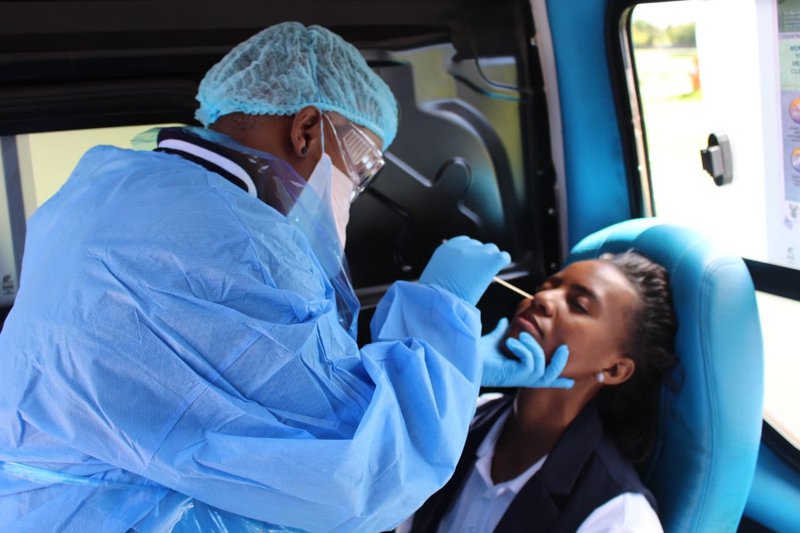Health workers sound alarm bells as virus spirals
Updated | By AFP
Health workers across South Africa's two southernmost provinces have been struggling with a surge in coronavirus patients as the country hurtles towards an expected disease peak in July.

"The numbers have been increasing daily -- we don't have enough space" said a casualty nurse at Livingstone Hospital, one of the three COVID-designated facilities in Eastern Cape.
Asking not to be named, she described a lack of personal protective equipment (PPE), back-to-back shifts and chaotic management.
"Last time I went on duty I got eight gloves," she told AFP by phone. "How do I work with eight pairs of gloves for a 12-hour shift?"
Coronavirus is pushing already-ailing hospitals in one of South Africa's poorest provinces to the brink.
The Eastern Cape has recorded the third-highest number of coronavirus infections in South Africa, accounting for nearly one in seven of more than 80,400 confirmed cases and 1,674 fatalities.
Health officials claim the disease spread from neighbouring Western Cape province, home to almost 60 percent of cases and around three-quarters of registered deaths.
The two provinces together have a population of 13.5 million out of a national population of 58 million.
ALSO READ:
WHO halts hydroxychloroquine trials on COVID-19 patients
A decades-old malaria and rheumatoid arthritis drug, hydroxychloroquine has been at the centre of political and scientific controversy. It has been touted as a possible treatment for the new coronavirus by high profile figures, including US President Donald Trump.
- 'Crippled system' -
In the province's city of East London, one doctor felt hospitals were under-equiped to handle both coronavirus and their usual flow of patients.
South Africa imposed strict confinement measures and banned the sale of alcohol in March to buy time for healthcare facilities to gear up for the pandemic.
But emergency wards have been swamped by a resurgence of trauma cases since booze sales resumed on June 1, prompting Eastern Cape Premier Oscar Mabuyane to call for the ban to be reinstated.
"It's hard to say whether we will be able to handle it," said the unnamed doctor, who voiced particular concern about the lack of ventilators and coronavirus training.
"It is already a crippled system so it's difficult... to prepare for a pandemic."
At least five health facilities across the Eastern Cape have been affected by strike action or closed for decontamination after staff tested positive this month, according to South African hospital union Hospersa.
Provincial health spokesman Sizwe Kupelo blasted hospital staff for playing "politics" and shutting down wards unnecessarily.
"This is a global pandemic and I have not heard of any country where after each and every positive case, health workers demand that the hospitals should close down," he told AFP.
Kupelo said over 200 health workers had tested positive for COVID-19 in Eastern Cape, many of who he believed contracted the virus outside medical facilities.
- Feeling 'unsafe' -
Meanwhile, hospitals in the Western Cape have been battling with the brunt of South Africa's epidemic.
"We have definitely had a lot more patients coming in," said an emergency doctor at a small district hospital outside Cape Town.
Speaking on condition of anonymity, she worried about a growing number of patients forced to spend the night on plastic chairs due to lack of beds.
"Every time I try to transfer a patient to ICU at our referring hospital they tell me they are full," she said.
"It's going to get very very tough," she feared. "We only have so many oxygen ports and having to decide who gets them: that's what terrifies me."
Nurses in Western Cape also fretted about over-stretched facilities and being unduly exposed to the virus.
"There is no way we can put patients 1.5 metres (five feet) away from each other," said a nurse at Cape Town's Tygerberg hospital.
"We feel very unsafe," she added.
"Last week we were assisting doctors with intubation in a room that had no extractor fans."
This week, a nurse who contracted COVID-19 sents an open letter complaining to Health Minister Zweli Mkhize.
"Ever since the virus set foot in the... (Western Cape) we are working non-stop at my hospital," wrote Beverley McGee, who works for a private clinic in Cape Town.
"Us nurses are emotionally drained, overwhelmed with anger, anxiety, fear, stress and disappointment."
ALSO READ:
Hairdressers, restaurants, cinemas to reopen
"There are businesses at have not earned any income or revenue and individuals that have not had any income for over 80 days.
- 'Wake up' call -
Western Cape health minister spokeswoman Nomawethu Sbukwana assured the province was "ready for the influx of cases", with field hospitals opened to "deal with the peak".
But as coronavirus spreads deeper into the country, some rural facilities have also started sounding alarm bells.
"Suddenly everyone just started coming back positive," said a doctor at Nompumelelo Hospital in the Eastern Cape town of Peddie.
"For small hospitals like ours that service populations in the middle of nowhere... support is very scant."
The doctor said the hospital, which serves a district of over 67,000 people, had grappled to secure PPE deliveries and proper guidance from health authorities.
"We are going to struggle a lot... if we try to portray this picture of serenity," he warned.
"The Eastern Cape is vulnerable, it is a very rural province. We need to be very honest with ourselves, and I think that's where our government needs to wake up."
Show's Stories
-
You're probably charging your phone wrong
Here are four misconceptions about phone batteries.
The Drive with Rob & Roz 3 hours ago -
Princess of Wales turns 43 with tribute from Prince William
Catherine, Princess of Wales, turned 43 on Thursday, with her husband Pr...
The Drive with Rob & Roz 6 hours ago